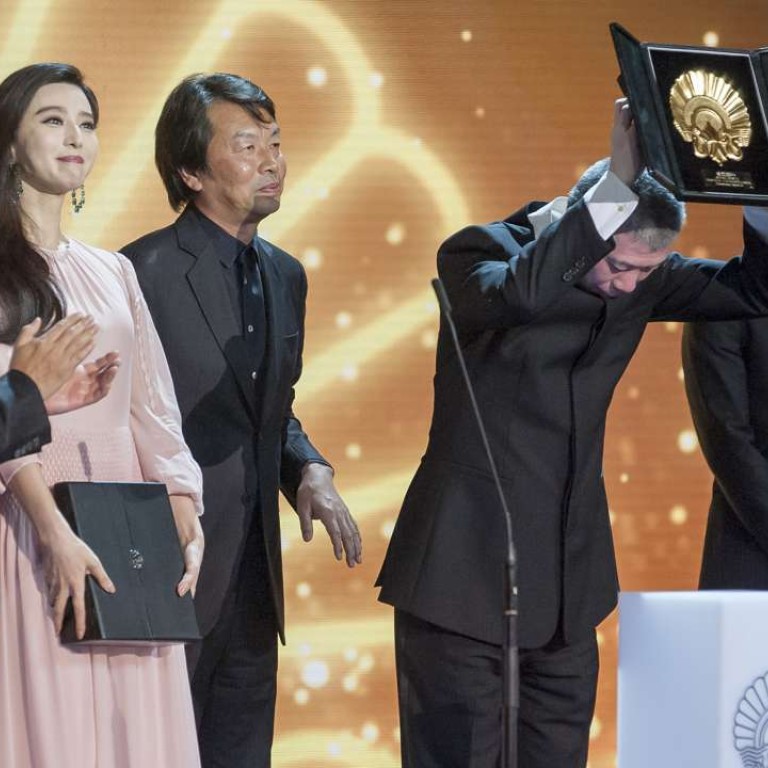
New | Huayi, Wanda in public row over star hire, threatening box office of China’s latest blockbuster
The seeds of the row were sowed in March when Huayi hired Jerry Ye Ning, general manager of Wanda Cinemas since 2008, as CEO of its movie studio
Huayi Brothers Media and Wanda Cinema Line, two of China’s largest movie production studios, have been embroiled in a war of words in the past week, in an open spat that threatens the box office receipts of the country’s latest award-winning blockbuster.
Feng Xiaogang, one of China’s largest-grossing directors from Huayi’s stable, fired the first salvo on Friday when he took to the country’s microblogs to write a missive, publicly accusing Wanda’s chairman Wang Jianlin of shutting out his latest satire I Am Not Madame Bovary (我不是潘金蓮) starring China’s best-paid actress Fan Bingbing.
The film, which opened on Friday, was alloted 40 per cent or more of the screening slots among cinemas across China. All except at Wanda, which operates Asia’s largest cinema chain, where Bovary was shown on only 10.9 per cent of screens in the country.
That’s a form of bullying, Feng wrote, in the style of a carefully crafted, satirical, classical Chinese allegory.
“Now that Wanda not only exercises the monopolistic power at home, but also is on track to take over Hollywood for the foreseeable future,” said Feng, dubbed by some as China’s home-grown version of Steven Spielberg for his ability to turn many movies into blockbusters.
Wanda is poised to become the world’s largest player in the cinema market with the acquisition of European peer Odeon & UCI Cinemas Group by its US unit AMC Entertainment by the end of the year. Wang recently boasted he planned to buy one of the “Big Six” Hollywood studios and unveiled a US$8.2 billion production facility in northeast Chinese city of Qingdao.
Referring to Huayi as a “poor little company,” Feng cited “the words on the streets” that all the films made by Huayi would be boycotted by “a furious” Wanda.
At the centre of the spat was Jerry Ye Ning, general manager of Wanda Cinemas since 2008, until Huayi hired him in March as CEO of the company’s movie studios.
Widely considered the mastermind of Wanda’s rise to the top of China’s film and television industry, Ye was expected by analysts to rejuvenate what is one of the country’s oldest private-sector entertainment empires. It is also understood that Ye had the knowledge of Wanda’s film production agendas for coming years, before he was poached by Huayi.
Ye could not be reached to comment. Wanda’s spokesman declined to comment in a written response to queries by the South China Morning Post.
“Chairman Wang, I wish you joy and every success in forming a monopoly,”Feng wrapped up the letter, calling on people to go to movies at Wanda’s rival cinemas before they were snapped up by Wang.
One hour after Feng’s open letter generated an outcry, Wang’s sole son and heir apparent Wang Sicong, an outspoken online celebrity and Wanda board member, fired back on his social media platform Sina Weibo by suggesting the Bovary’s underwhelming screening arrangement was due to its poor box office, which Wanda had expected all along.
“This is just a grudge between the two companies. There is no point in stirring up public opinion using your fame to attack us...Why should we be happy with your having poached our senior management?” the younger Wang said.
The tensions heightened when Huayi’s co-founder and chief executive Wang Zhonglei, unrelated to the Wanda founder’s family, entered the broil, reminding the Wanda scion that he had done his share of poaching from Huayi.
“Sicong, let’s get down to the issues first, you will find many of Wanda Cinemas’ current senior managers previously with Huayi, for instance Du Yang and Li Xue,” the Huayi CEO wrote in his blog.
Even the People’s Daily -- the Communist Party’s mouthpiece newspaper -- saw the need to insert itself into the row, with a post on its Sina Weibo account admonishing Feng for “quarrelling with others” instead of “focusing on winning good word of mouth with his work.”
Bovary has been the top grossing film in China over the last few days since it hit the cinema screens, having collected 232.2 million yuan (US$33.7 million) in ticket sales within five days, and it was given about 33.95 per cent of available screening slots at China’s cinemas, according to data from industry researcher Entgroup.
The black comedy defying Chinese petty bureaucracy was awarded the Concha de Oro, or the Golden Shell, for best film at the San Sebastian Film Festival in Spain in September, while Fan snatched the award for best actress.
This wasn’t the first time that Huayi had publicly accused cinema chains of blackballing its movies, such as during the screening of the animated feature Rock Dog .
Feng is a major shareholder of little known studio Zhejiang Dongyang Meila Media, which Huayi acquired last year for 1.05 billion yuan.
According to the terms of the agreement, Meila Media, who is also a producer of Bovary, pledged to generate at least 100 million yuan of net profits for 2016.
Feng was placing a huge bet on the Bovary’s box office receipts in order to live up to the pledge Meila Media had made in the deal, prompting him to make an all-out effort to promote it, analysts said.
“Now everybody knows Bovary after Feng’s public row with Wanda,” said Ryan Zhao, a media industry analyst with Guotai Junan Securities. “This film is getting so much publicity thanks to this war of words, which in a sense, can help drive up box office sales.”

